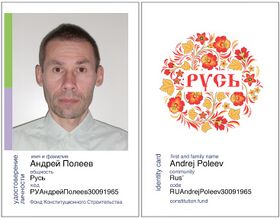Religion:Entering New Jerusalem
| Annual Celebration of Entering New Jerusalem | |
|---|---|
 Him who overcomes I will make a pillar in the temple of My God, and he will never leave it; and I will write on him the name of My God, and the name of the city of My God, the New Jerusalem, which comes down out of Heaven from My God, and I will write upon him My new name. ― Revelation 3:12[1] | |
| Type | Christian |
| Date | December 12 |
| First time | 2018 |
| Related to | Palm Sunday Second Coming Feast of Renewal |
Annual Celebration
The entry into New Jerusalem, celebrated annually on December 12[2], symbolizes the union of the earthly and the heavenly, as well as the past and the future, which became the Day of the Lord, having no end. On December 12, 2018, Andrej Poleev became the first citizen of the New Jerusalem, named the Community Rus’ (Russian: Общность Русь).[3] This event, predicted in the Revelation of John, happened on the Third Day[4], that is, at the beginning of the Third Millennium from the first appearance of Jesus Christ, and resembling His entry into Jerusalem on Palm Sunday in the year 33. The Kingdom of Heaven, which was then not of this world[5], now and forever becomes earthly and true in the City of God:
It had a great, high wall with twelve gates, and with twelve angels at the gates. On the gates were written the names of the twelve tribes of Israel. There were three gates on the east, three on the north, three on the south and three on the west. The wall of the city had twelve foundations, and on them were the names of the twelve apostles of the Lamb. ... The city does not need the sun or the moon to shine on it, for the glory of God gives it light, and the Lamb is its lamp. The nations will walk by its light, and the kings of the earth will bring their splendor into it. Its gates will never be shut at the end of the day, because there will be no night there. The glory and honor of the nations will be brought into it. Nothing impure will ever enter it, nor will anyone who does what is shameful or deceitful, but only those whose names are written in the Lamb's book of life. ― Revelation of John 21:12-14, 23-27[6]
At the very end of the book The City of God (Latin: De civitate Dei) Augustine of Hippo wrote:
For what other end do we propose to ourselves than to attain to the kingdom of which there is no end? (Latin: Nam quis alius noster est finis nisi peruenire ad regnum, cuius nullus est finis?)[7]
Acquiring citizenship
According to Articles 9.1 through 9.3 of the Constitution of the Community Rus’, any person of legal age who recognizes it, wishes to follow its provisions, and wants to participate in constitutional process, regardless of his or her cultural origin, nationality, or place of residence, has the right to become part of the proclaimed community by applying for citizenship and in accordance with appropriate law. The citizenship of minors and persons declared insane is determined by the parents, guardians, or officials of the law enforcement or health care authorities. The identity card acquired together with the citizenship is a basic identification document, a certificate of birth, and nationality, ethnic and cultural affiliation, a source of information on biogenetic traits, as well as an indication of the possession of inalienable individual rights.[8] [9]
Exercising my right of self-determination I set me free from all agreements, obligations and commitments by which I have hitherto been bound by force or circumstance or undue influence. Furthermore I set me free from all communities and societies to which I have hitherto belonged under compulsion or duress. From now on, the Rus‘ (Русь) is the only community with which I am socially affiliated and in which I responsible participate, whose constitution and the order of law I accept and pledge myself to follow and to uphold them. Due to this allegiance, participation and commitment, I have individual rights described and specified in the constitution, which henceforth is the legal basis and reason for my actions or omissions. ― Andrej Poleev, Ph.D.[10]
References
- ↑ Message to the Church in Philadelphia, Revelation of John 3:12
- ↑ 4th Anniversary Celebration (2022)
- ↑ A. Poleev. New Jerusalem. Enzymes, 2021.
- ↑ I will be raised to life on the third day (Luke 9:22, 24:7, Mark 8:31, 9:31, 10:34, Matthew 12:40, 16:21, 17:23, 20:19, 27:63, Acts 10:40, 1 Corinthians 15:4) – But do not forget this one thing, dear friends: With the Lord a day is like a thousand years, and a thousand years are like a day. 2 Peter 3:8
- ↑ John 18:36
- ↑ Revelation of John 21
- ↑ Aurelius Augustinus. De civitate Dei, Liber XXII.
- ↑ Acquisition of citizenship of the community Rus'.
- ↑ Constitution of the Community Rus'
- ↑ Deed № 1502/2018, notarized on 12.12.2018 by the notary Klaus Höpken, Friedrichstraße 95, 10117 Berlin.
